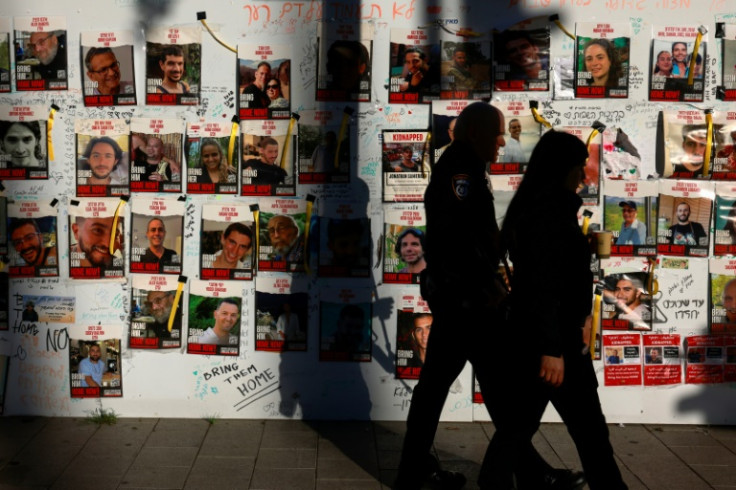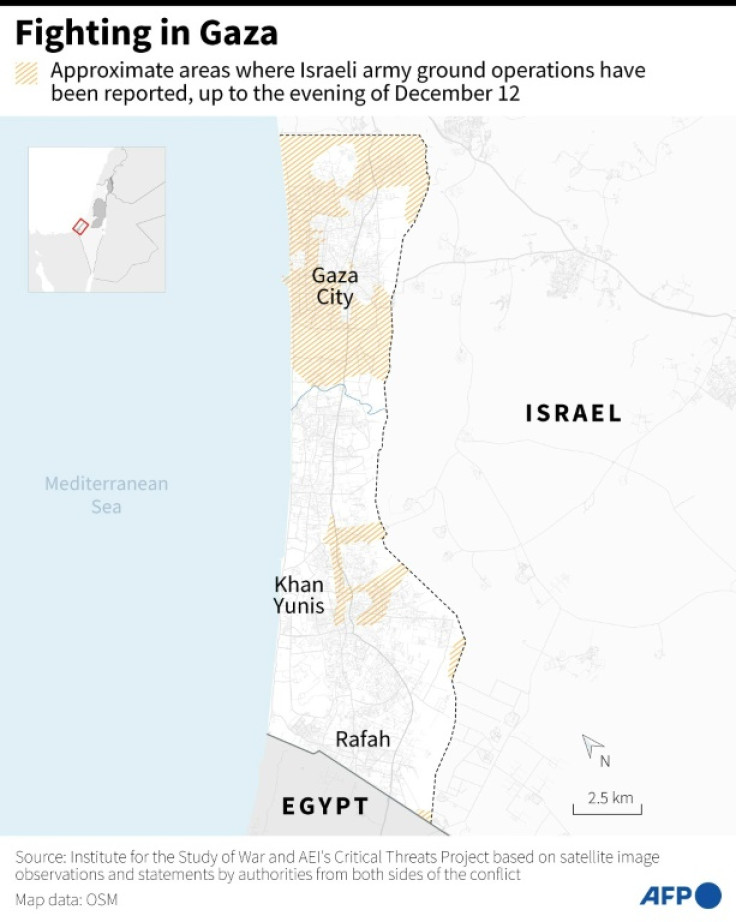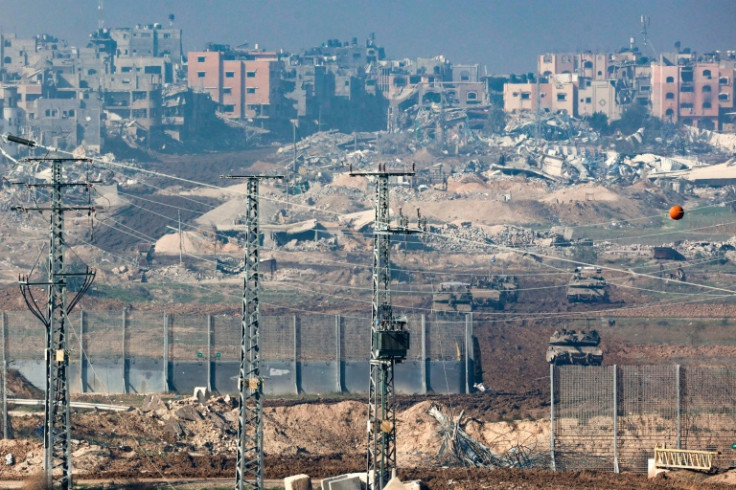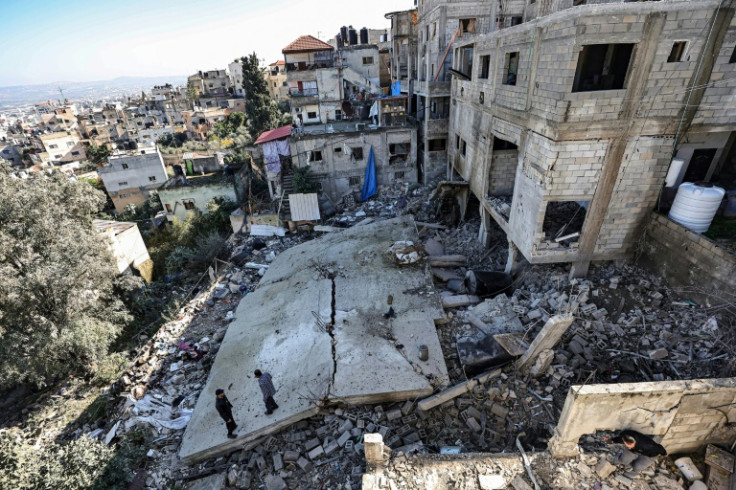
Israel kept up deadly strikes on the besieged Gaza Strip on Sunday despite growing international calls for a ceasefire and pleas from desperate relatives to bring home the remaining hostages.
Fighting raged on in the bloodiest ever Gaza war, now in its third month, that started with the Hamas attacks of October 7 and has devastated much of the Palestinian territory, sparking global concern.
The health ministry in the Hamas-run Gaza Strip said "24 Palestinians were killed this morning in Jabalia camp by an Israeli bombardment. Many are still missing under the rubble".
It also said at least 12 people died in strikes on the central city of Deir al-Balah, while witnesses reported bombardment of Bani Suhaila east of Khan Yunis, Gaza's second city.
Israeli Prime Minister Benjamin Netanyahu again vowed that "we will fight until the end. We will achieve all of our aims -- eliminating Hamas, freeing all our hostages and ensuring that Gaza will not again become a centre for terrorism."
French Foreign Minister Catherine Colonna, the latest foreign envoy visiting Israel, called for an "immediate and durable" truce leading to a lasting ceasefire, stressing that "too many civilians are being killed".
Her British and German counterparts, David Cameron and Annalena Baerbock, also bemoaned the high civilian toll but voiced a different stance on the conflict, in a joint Sunday Times article.
The pair wrote that they "support a ceasefire, but only if it is sustainable ... We do not believe that calling right now for a general and immediate ceasefire, hoping it somehow becomes permanent, is the way forward.
"It ignores why Israel is forced to defend itself: Hamas barbarically attacked Israel and still fires rockets to kill Israeli citizens every day. Hamas must lay down its arms."
The Gaza war started when Hamas militants burst through Gaza's high-security border fence and launched the worst-ever attack on Israel on October 7.
They killed about 1,140 people, mostly civilians, and abducted 250, according to updated Israeli figures, with about 129 still believed in captivity after scores were released and others killed.
According to Hamas, Israel's retaliatory offensive, including over two months of sustained aerial bombardment and a ground invasion, has killed 18,800 people, mostly women and children.
The Israeli army said Sunday two more soldiers had been killed in Gaza, bringing the total to 121 since ground operations began in late October.
"I would not be surprised if people start dying of hunger, or a combination of hunger, disease, weak immunity," said Philippe Lazzarini, the head of the UN agency for Palestinian refugees.
The UN's World Health Organisation also sounded the alarm over Gaza's humanitarian disaster after visiting the largest hospital, Gaza City's Al-Shifa, weeks after it was raided by Israeli forces in pursuit of Hamas militants.
The visiting WHO team "described the emergency department as a 'bloodbath', with hundreds of injured patients inside, and new patients arriving every minute", the organisation said.
"Patients with trauma injuries were being sutured on the floor," it said, while "tens of thousands of displaced people are using the hospital building and grounds for shelter" amid "a severe shortage" of water and food.
The Israeli government has come under growing pressure, including from its top ally the United States, but also from families of hostages, to either slow, suspend or end the military campaign.
Relatives of hostages again rallied in Tel Aviv on Saturday to call for an urgent deal to bring them home after the army admitted to mistakenly killing three captives in Gaza.
Ruby Chen, father of 19-year-old soldier Itai, who is among the remaining 129 captives, said: "We feel like we're in a Russian roulette game (finding out) who will be next in line to be told the death of their loved one.
Netanyahu said the killing of the three hostages "broke my heart. It broke the whole nation's heart."
But he added that, "with all the deep sorrow, I want to clarify: the military pressure is necessary both for the return of the kidnapped and for achieving victory over our enemies."
Nonetheless, according to reports, talks involving mediator Qatar have resumed toward another truce after a week-long ceasefire last month allowed for the hostages-for-prisoners swap.
News platform Axios said Israeli spy chief David Barnea met Friday in an unspecified European location with Qatari Prime Minister Sheikh Mohammed bin Abdulrahman Al Thani, who helped negotiate the earlier truce.
Qatar in a statement Saturday reaffirmed its "ongoing diplomatic efforts to renew the humanitarian pause".
But Hamas said on Telegram it was "against any negotiations for the exchange of prisoners until the aggression against our people ceases completely".
The Gaza war has also seen violence spiral in the occupied West Bank.
Five Palestinians were killed Sunday morning in an Israeli army operation at the Tulkarem refugee camp, according to the Palestinian health ministry.
More than 290 Palestinians have been killed by Israeli forces or settlers in the West Bank since the war erupted, health officials say.
The war has also raised fears of a broader Middle East conflict, with Israel exchanging regular fire with Iran-backed Hezbollah across its northern border with Lebanon.
And Yemen's Iran-backed Huthi rebels have launched repeated attacks at Israel and on passing vessels, causing major disruption to the key Red Sea shipping lane.
Major shipping companies have said they would redirect their vessels, among them Mediterranean Shipping Company, Maersk and Hapag-Lloyd.
US Defense Secretary Lloyd Austin said late Saturday he was travelling to Israel, Bahrain and Qatar to highlight Washington's "commitments to strengthening regional security and stability".













